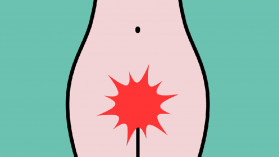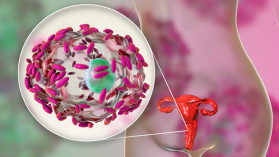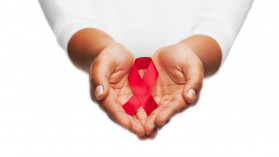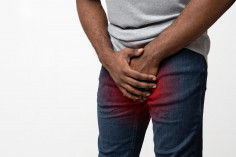Get Informed Topics Safer Sex & STIs Types of STIs HPV
HPV
What is HPV?
- HPV is a viral infection, short for Human Papilloma Virus.
- There are over 100 strains or kinds of HPV, around 40 of which affect the genital and anal or butt area.
- Genital HPV infections are usually cleared up by the immune system on their own over time. However, when the virus is not cleared, it remains in the body and can cause health problems.
- Low-risk HPV can cause genital warts, little bumps that can grow on the penis*, anus (butthole) or on the outside and inside of the vagina. Rarely, warts can appear in the mouth or throat.
- High-risk HPV can cause changes to the cells of the cervix or the opening to the uterus that can lead to cervical cancer. It can also lead to cancer in the anus, penis, mouth, and vulva (the genital area outside the vagina).
- The majority of people with HPV do not show any symptoms of HPV and most people don’t even know they have it.
How do you get HPV?
- You do not need to have sexual intercourse to get HPV. HPV is transmitted through skin-to skin-contact, particularly genital skin-to-skin contact, with someone who already has HPV.
- Activities that involve skin-to-skin contact include rubbing naked genitals together, finger play with someone’s genitals and oral or mouth contact with someone’s genitals or anus, as well as vaginal or anal sex.
- You can spread HPV if you are sharing sex toys and you don’t disinfect or put a new condom on them each time a new person uses the toys.
- Your partner(s) may not have an outbreak (warts that you can see), but they can still spread the type of HPV that causes warts to you.
- A pregnant person may pass the virus to their baby during vaginal delivery.
How do you know if you have HPV?
- In many people, HPV does not cause any symptoms. Even without symptoms, you can still pass it on to your sexual partner(s).
- If you have a low-risk type of HPV, you may find warts near the infected area. They may look like small, flesh-coloured hard spots. You may also experience itching, pain or bleeding when having vaginal or anal sex.
- If you have a high-risk type of HPV, there are rarely symptoms of the changes that HPV can cause in the cells of the cervix or other infected areas. If you have abnormal cells in your cervix, a Pap test will likely find them.
- It is important to be familiar with how your body looks and feels. If you notice anything unusual, you can have your clinician check it out right away. If you do have HPV, the earlier the treatment, the easier it is to clear the warts or the abnormal cells.
How and where can you get tested for HPV?
- You can get tested for HPV in most public or private health facilities in your area. Find a clinic near you in the clinic finder here (Link)
- There is no special test for low-risk HPV or warts. A clinician can tell if you have warts by looking at any bumps you may have in and around your genitals and anus.
- A Pap test involves a small brush that sweeps the cervix to collect a sample of cells. The cells are then examined to see if there are any changes likely caused by high-risk HPV. These changes usually go away on their own, but they need to be monitored to make sure they go away. If they don’t, treatment is available.
- A Pap test in the rectum or butt is also available, but it is not commonly done.
- There is a DNA test for high-risk HPV found only on the cervix. However, this test is usually only done for people who are over 30 years of age and have a history of abnormal Pap tests.
- There is currently no test that detects changes in the cells caused by HPV inside the penis, mouth, or throat.
What if you test positive for HPV?
- If you test positive for HPV, it means you have it.
- There is currently no cure for HPV. Most people will eventually clear the virus, but there is no way to know for sure if you have cleared the virus or not.
- If you have warts, they can be treated. Most people stop getting outbreaks of warts after 1 to 3 years. Some people only ever have one outbreak. Even if you stop getting outbreaks you can still pass the virus on to your partner(s).
- Warts can be treated by a clinician with liquid nitrogen, lasers, or surgery. There is also a special cream that can be applied to the warts at home. Multiple treatments are usually necessary to remove warts.
- If you have a cervix and your Pap test shows that HPV has caused changes to the cells of your cervix, it does not mean you have cancer. You will usually just need more frequent Paps in order to monitor those cells. The cellular changes will usually go away on their own. If they don’t, you may be sent to a specialist for further testing or treatment.
How can you lower your risk of getting HPV and/or passing it on to your partner(s)?
- Make informed decisions. Talk to your partner(s) about STIs and the use of safer sex tools, such as condoms.
- Use condoms on penises or dildos for vaginal or anal sex, use latex gloves for finger play and fisting, and use condoms/dams for oral sex to lower your chances of getting or transmitting HPV.
- Because condoms do not cover the entire area affected by HPV, they do not provide the same level of protection from HPV as they do for most other STIs. However, they can still reduce the risk of transmitting HPV.
- If you are sharing sex toys, be sure to disinfect them or put a new condom on the toys when a new person uses them.
- It is possible to spread low-risk HPV even if someone doesn’t have visible warts (an outbreak). However, avoiding skin-to-skin contact while someone is having an outbreak can help reduce the possibility of transmission.
- There are now 2 vaccines that can help you avoid getting HPV, but they do not protect you from all the different strains of the virus. Gardasil can help prevent against 2 strains of HPV, which can lead to cervical cancer and 2 strains of HPV, which can lead to warts. Cervarix helps prevent 2 strains of HPV, which can lead to cervical cancer only.
Frequently Asked Questions
Male Body
1 questions
See frequently asked questions on Male Body
Let's Talk
Facts, tips, stories and common questions
Go to Forum




